Using AI to control energy for indoor agriculture
30 September 2024
Published online 23 June 2015
Budding women researchers can learn a thing or two from these prominent scientists.
Professor of Neurology at the Faculty of Medicine, AUB. Director of the Abu Haidar Neuroscience Institute (AHNI).
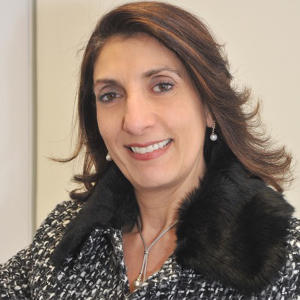
We all realise that there are still many barriers that hinder the rise of female scientists. Nonetheless, women scientists should focus on the fact that success is achievable and doesn’t have to come at the price of a personal life.
As I think back on my career, I can identify several things that supported me in my journey. For the young female scientists I would say, first know your strength. Recognize your abilities and do not allow others to shake your belief in yourself, be it family or colleagues. Second, don’t be afraid of hard work – don’t count the hours, science is a career not a job.
Third, find a mentor. This holds true for both female and male scientists. As Albert Schweitzer said “Example is not the main thing influencing others, it is the only thing”. Mentors help their mentees acquire and integrate new learning, manage transitional states, and maximise their potential to become a fulfilled and achieving scientist. If available, find a female mentor or a male mentor who is known for his support of women’s careers in science.
Fourth, and perhaps most importantly for female scientists, choose your spouse carefully. A supportive spouse that is invested in your career is indeed a powerful ally. He shares family and social responsibilities and serves as a springboard for discussing new ideas and career choices.
Young scientists need to develop an area of expertise and be gradually recognised for their contributions to that area. Do not make the mistake of going into too many scientific directions even if your interests are varied; Focus first…expand later. Young scientists must learn the art of collaboration. The view of the scientist labouring alone in her laboratory is arcane, as real science is now a collaborative effort. Another important lesson is to learn how and when to say “no”. Because of the inherent gender inequality in the system, female scientists may find that they are recruited to do the less rewarding jobs in the department, or asked for more than their share of teaching or administrative jobs. Learning when and how to say no becomes critical for women trying to balance family and career.
Lastly, I would say don’t try to imitate men in behaviour or approach. Women have their own way of dealing with conflict and do not have to be confrontational or harsh unless they are comfortable with this approach.
Khawla S. Al-Kuraya, Professor of Pathology and Director of the Research Centre at KFNCCC, King Faisal Specialist Hospital & Research Centre.
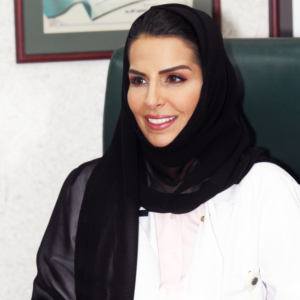
Much like most pieces of advice, it may come off as cliché and underwhelming in its optimism and simplicity. Though, believe it or not, only by embodying such a philosophy was I able to make it from being an ambitious young girl in the conservative and isolated Northern Province of Al Jouf in Saudi Arabia to a US Board Certified pathologist and Director of King Fahad National Centre for Children’s Cancer and Research in Riyadh. Only through personifying Mother Teresa’s ‘do it anyway’ mentality was I able to endure such a brutal career journey as a Saudi Arabian female, and penetrate the male-dominated Saudi Arabian scientific research scene. Indeed, only without seeking reward, apart from personal fulfilment and satisfaction, was I able to conduct good science: science that has gotten my laboratory involved in the International Cancer Genome Consortium as the first from the Middle East.
I had to do the road paving myself - a phenomenon many young Arab intellectuals will face - and only managed to do so by being unreservedly goal-oriented. The system is irrelevant. You won’t be able to change it, so don’t work for it. Work for a grander purpose. In a place where fraud, bogus publications, quackery and tribal therapy are alive and well, perform sophisticated, ethical, high quality research anyway. In a place that does not distinguish a high-impact publication from one published in a low-impact journal, aim for high-impact anyway. Take full advantage of region-specific privileges such as the billions being poured into STEM in the Gulf, aggressively dismiss the systemic flaws, and do it. Anyway.
Professor of Physics, University of Tunis. Former director of the Preparatory Institute of Science and Technical Studies, and former Secretary of State to the Minister of Higher Education, in Tunisia.
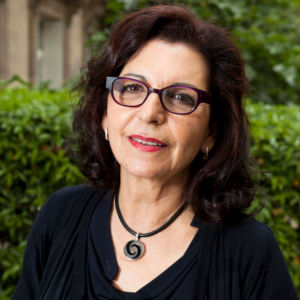
Today, main decisions are being taken around what the future of the planet should be. This will affect generations to come, water resources, renewable energies, climate change, promotion of agriculture… Moreover, scientific progress is not equally shared around the world and the gap between developed countries and what is called “the South” is increasing dangerously. This gap has to be reduced. This is why, it is essential that the whole society, women and men, should master science and technology. I think that women could play a big role in the development of science and technology in their countries by contributing to the development of scientific research and by building up their confidence and realising that they can be the pillars of the progress of their countries. I hope to see them involved in science to support the transition of their country from the status of consumer to the status of contributor and leader in science and technology. This goal is possible. Young women must have confidence in themselves and be convinced that their country needs all the intelligence.
Professor of Biomedical Sciences Program, University of Science and Technology. Director, Center of Excellence for Stem cells and Regenerative Medicine (CESC), Zewail City of Science and Technology.
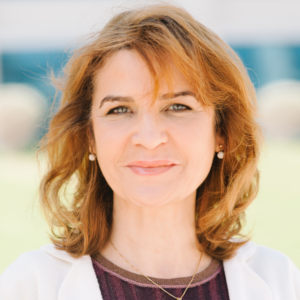
First, do not focus on the gender issue. Being a woman can be an advantage or a disadvantage, depending on factors that are often tied to the culture around you. But in the information age, more than in any other time, real talent is what really counts. Second, focus. Learn one thing very well and become the best at it. While having general information about a broad topic, like cancer for example, is a good start, focusing on one aspect of the disease, like how it metastasises, and becoming the best expert at it, will make you unique. This uniqueness will make you valuable and highly sought after.
Third, learn everything you can about your subject. Read, use the Internet, and find an accomplished and supportive mentor. Use all your resources to learn and network. Practice your skills until you master them, and then practice again.
Fourth, work hard. Put in all the hours necessary because there are no short cuts to real success. Fifth, work smart. Know the tasks you need to accomplish and find the most efficient way to achieve them, without sacrificing quality.
Sixth, persevere and never be afraid to fail. Consider every failure as an opportunity that brings you closer to success. A quote that left an impression on me was, “Success is moving from one failure to another without losing enthusiasm” by Winston Churchill. However, it is also important to move from one failure to another quickly and not to dwell on the negative. Of course, I am not advocating failure, but I am emphasising perseverance. When you move quickly from one failed task to a new one, it is important not to get discouraged; sometimes you must fail many times before you can succeed.
Seventh, remember that you are a woman. Now that you have worked hard and acquired all the tools necessary to succeed, you can address the gender issue. Some employers will not hire you or promote you simply because you are a woman; this may be due to ignorance, poor information, or just pure prejudice. But with the tools and skills you have acquired, you now have your best chance to flourish and overcome the stereotypes and hurdles that lie ahead of you. One last word: It is important to realize that all of us, and not only women, must work hard to break the multitude of glass ceilings that prevent us from achieving our goals.
Associate pathologist at Brigham and Women's Hospital-Boston. Junior faculty at Harvard Medical School-Boston. Postdoctoral researcher at Dana Ferber Cancer Institute-Boston.
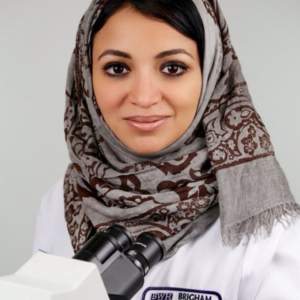
Effective mentoring was key in my case in addition to my passion to my specialty. Mentoring associated with high research productivity, public visibility, and increased professional growth. Developing mentoring networks rather than on hierarchical mentoring is very important. It’s important to surround yourself with people who want you to succeed. Mentorship can have different shapes these days and the best is to have multiple mentors (i.e. technical and developmental). It’s also very important to revisit your development network from time to time to see what you are missing. You must be willing to try again and alter your plans.
Arab women physicians and scientists are a great human resource and their role in our society is vital. The involvement and engagement of these talented women in science and technology will contribute to sustainable economic growth and gender equality. However, there is a pronounced imbalance between men and women in science and engineering in the Middle East work places. Providing equal opportunities for women in science requires change at every level including: academic culture, research management, family support, and equal funding opportunities. The lack of role models women in research and scientific leadership is another issue. Supporting leadership positions for females in science would provide an opportunity for intellectual exchange to help find creative solutions for how science and technology training can help uplift the status of Arab women and inspire our daughters to gain their rightful place in the scientific society and Middle Eastern society at large."
doi:10.1038/nmiddleeast.2015.105
Stay connected: